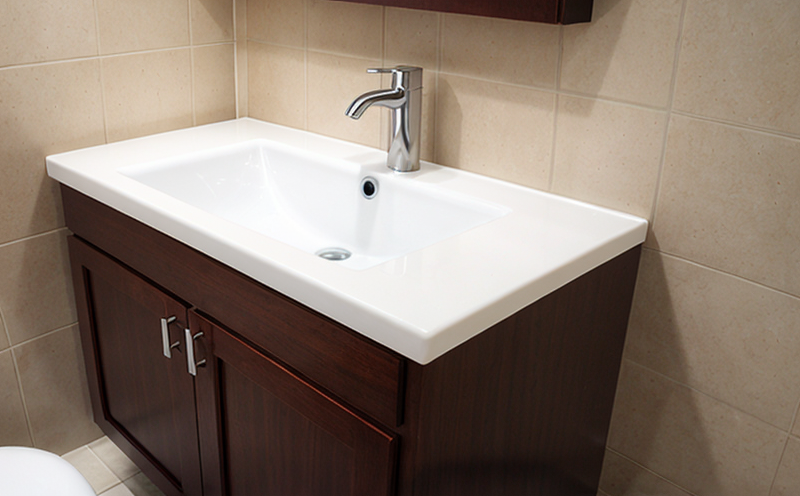UNE EN ISO 1183 Density Testing of Sanitary Plastics
The UNE EN ISO 1183 series specifies methods to determine the density and apparent density of plastic materials, particularly relevant for sanitary plastics used in bathroom and sanitation applications. This testing method is critical for ensuring product quality and compliance with international standards, especially when dealing with materials that must perform under specific environmental conditions.
The process involves precise measurement techniques aimed at quantifying the mass per unit volume of the material, providing a reliable indicator of its composition and consistency. The test is particularly important in the bathroom and sanitation sector where durability, functionality, and safety are paramount. Compliance with UNE EN ISO 1183 ensures that products meet stringent quality benchmarks set by international standards.
Understanding the density of sanitary plastics helps manufacturers optimize material use, enhance product performance, and ensure they adhere to regulatory requirements. Accurate density measurements can influence a variety of properties including strength, flexibility, and resistance to environmental factors such as temperature changes or chemical exposure. This testing method is not only essential for quality control but also plays a key role in the research and development process.
The procedure typically involves cutting specimens from the plastic material according to predefined dimensions specified by UNE EN ISO 1183, then measuring their mass using calibrated scales. The volume of the specimen is determined through various methods depending on its geometry, including displacement techniques or geometric calculations for regular shapes. The results are reported as density and apparent density, which can be used to compare different materials or batches.
Accurate density testing is crucial in ensuring consistent product performance across batches and suppliers. It helps identify any variations in material composition that could affect the final product's quality. This information is vital for manufacturers looking to optimize their production processes, improve product design, or ensure compliance with environmental regulations. The test also supports quality assurance efforts by providing data that can be used to monitor process stability and detect any deviations from expected values.
Compliance with UNE EN ISO 1183 is a key aspect of ensuring the reliability and safety of sanitary products in the bathroom and sanitation sector. By adhering to these standards, manufacturers can demonstrate their commitment to quality and customer satisfaction. This testing method plays an essential role in maintaining high-quality benchmarks that are recognized globally.
Understanding the density of sanitary plastics is crucial for optimizing material use, enhancing product performance, and ensuring compliance with international standards. Accurate density measurements provide valuable insights into a material's composition and properties, supporting quality assurance efforts and research and development initiatives.
Why Choose This Test
- Ensures compliance with UNE EN ISO 1183 standards
- Provides accurate measurement of density and apparent density
- Supports consistent product quality across batches and suppliers
- Aids in optimizing production processes and improving design
- Maintains high-quality benchmarks recognized globally
- Facilitates monitoring process stability and detecting deviations
- Enhances the reliability and safety of sanitary products
- Demonstrates commitment to quality and customer satisfaction
Quality and Reliability Assurance
The importance of UNE EN ISO 1183 density testing cannot be overstated. In the bathroom and sanitation sector, where materials must withstand rigorous conditions, accurate density measurements are crucial for ensuring product reliability and safety. By adhering to these standards, manufacturers can demonstrate their commitment to quality and customer satisfaction.
Accurate density measurements provide valuable insights into a material's composition and properties, supporting quality assurance efforts and research and development initiatives. This testing method is particularly important in the production of sanitary products that must meet stringent regulatory requirements. By ensuring consistent product performance across batches and suppliers, manufacturers can maintain high-quality benchmarks recognized globally.
The test also plays an essential role in monitoring process stability and detecting any deviations from expected values. This helps to identify potential issues early on, allowing for corrective actions to be taken promptly. The use of UNE EN ISO 1183 ensures that products meet stringent quality benchmarks set by international standards, which is particularly important when dealing with materials that must perform under specific environmental conditions.
The testing method also supports the development and optimization of new products. By understanding the density of sanitary plastics, manufacturers can make informed decisions about material selection, design improvements, and process enhancements. This knowledge helps to ensure that products are both functional and reliable, meeting the expectations of customers and regulatory bodies alike.
Compliance with UNE EN ISO 1183 is a key aspect of ensuring the reliability and safety of sanitary products in the bathroom and sanitation sector. By adhering to these standards, manufacturers can demonstrate their commitment to quality and customer satisfaction. This testing method plays an essential role in maintaining high-quality benchmarks that are recognized globally.
Use Cases and Application Examples
The UNE EN ISO 1183 density test is widely used across various applications within the bathroom and sanitation sector. Here are some specific use cases:
- Determining the optimal material composition for shower trays, bathtubs, and sinks to ensure durability and longevity.
- Ensuring consistent quality in molded products like toilet seats and bidets by measuring their density.
- Monitoring the production process of plastic piping systems to maintain uniform specifications across all units produced.
- Aiding in the development of new materials for sanitary applications, such as water-saving urinals or eco-friendly toilet paper holders.
The test is particularly useful for manufacturers who need to comply with international standards and ensure consistent quality. It helps them make informed decisions about material selection, design improvements, and process enhancements. By understanding the density of sanitary plastics, manufacturers can optimize their production processes, improve product performance, and ensure compliance with environmental regulations.
Accurate density measurements are crucial for optimizing material use, enhancing product performance, and ensuring compliance with international standards. This testing method provides valuable insights into a material's composition and properties, supporting quality assurance efforts and research and development initiatives in the bathroom and sanitation sector.





